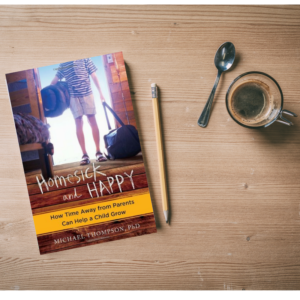May 14, 2021
Visit Sunshine Parenting for more posts, podcast episodes, and free downloadable resources.
About Michael
For nearly thirty-five years, Michael Thompson, Ph.D. has worked as a clinical psychologist, school consultant and international speaker on the subjects of children, schools and parenting. He's authored nine books focusing on the emotional lives of boys, friendships and social cruelty in childhood, the impact of summer camp experiences on child development, the tensions that arise in the parent-teacher relationships, and psychological aspects of school leadership. Michael's work with independent schools and public school districts throughout the United States, and with international schools in Europe, Asia and South America takes him to about fifty schools a year to lead workshops for teachers, administrators, parents and students.
Homesick and Happy:
How Time Away from Parents Can Help a Child
Grow
Every child has to practice being independent and every parent has to practice letting his or her child be independent.
Most kids feel some apprehension before going on their first adventure away from home without parents. Many parents are also nervous about the separation from their child, especially if your camper is expressing anxiety about going away to camp.
 The biggest source of parental
concern is often how your child will handle the separation from you
and if they will experience negative emotions, often referred to as
“homesickness,” while at camp. While most kids do not feel extreme
symptoms of homesickness at camp, many experience emotional
challenges during their first (and subsequent) experiences at
summer camp and other away-from-parent experiences. These feelings
are normal and are something that we have helped many campers work
through. Campers feel a great sense of accomplishment when they
successfully overcome the challenge of homesickness, and we
encourage you to view this experience through the lens of the
long-term positive outcomes for your child.
The biggest source of parental
concern is often how your child will handle the separation from you
and if they will experience negative emotions, often referred to as
“homesickness,” while at camp. While most kids do not feel extreme
symptoms of homesickness at camp, many experience emotional
challenges during their first (and subsequent) experiences at
summer camp and other away-from-parent experiences. These feelings
are normal and are something that we have helped many campers work
through. Campers feel a great sense of accomplishment when they
successfully overcome the challenge of homesickness, and we
encourage you to view this experience through the lens of the
long-term positive outcomes for your child.
Homesick and Happy, by Michael Thompson, Ph.D., is an excellent resource, not only as you prepare to send your child to camp this summer, but also as you think about and prepare your child for other future adventures away from you (like college!).
Quotes from Homesick & Happy
Children want to be independent, and they realize that they cannot be truly independent until they beat homesickness, even when they have a painful case of it.
At sleepaway camp, campers send an average of zero texts per day. Into the space created flows a bunch of old-fashioned human behaviors: eye-to-eye contact, physical affection, spontaneous running and jumping, or simple wandering.
Resources/Related
Ep. 10: Homesick & Happy with Michael Thompson
Ep. 39: How to Handle Your Camper's Homesickness
How to Respond to a Homesick Letter from Your Camper
10 Messages for a Homesick Camper
Secondary Homesickness: When Your Camper doesn't want to go BACK to Camp
